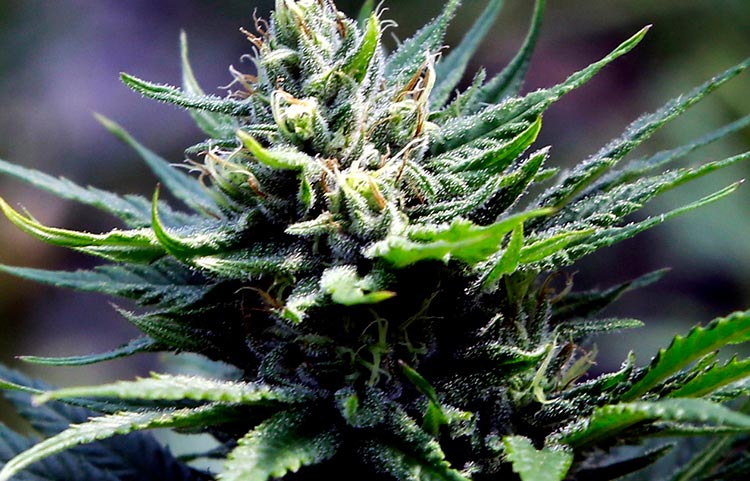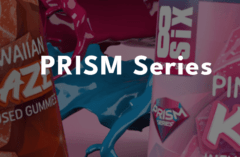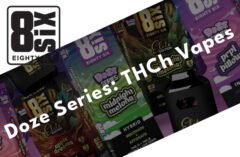Table of Contents [show]
Delta-8 THC benefits – Let’s talk…The cannabis plant is full of active cannabinoids, terpenes and other substances, the most well-known being cannabidiol (CBD) and tetrahydrocannabinol (THC). CBD is primarily renowned for being the most beneficial cannabinoid for the human body, while THC is known for the main effect cannabis is famous for: it gets you high.
However, that’s not all. There are more than a hundred other cannabinoids present in the cannabis and hemp plant, like CBG, CBN, and Delta-10 THC, which are much lesser-known. Below, we’re going to talk about the Delta-8 THC benefits, as its a close analogue of regular THC that is currently experiencing an impressive rise in popularity.
Delta-8 is considered to be the legal alternative to regular THC. For some, it’s even better, as it offers many of the same benefits as THC, but with a much less intoxicating high. As you can imagine, this new demand has cannabis professionals diving into the Delta-8 production and developing new products shipping throughout the United States.
But what exactly is Delta-8 THC?
What is Delta-8 THC?
Delta-8 THC is one of the cannabinoids found in limited quantities in the cannabis or hemp plant. Through a certain extraction method and isomerization process, hemp-derived CBD oil extracted from the plant is transformed into types of THC: Delta-9-THC (to which we simply refer as THC), Delta-10 and Delta-8-THC.
Those are similar in chemical structure, with Delta-8 and Delta-9 also sharing a double bond (located in different parts in each one of the two types), which is thought to be responsible for the intoxicating effects of THC ―though Delta-8 is much less potent.
A lot of research has been done on the safety of Delta-8 THC since the 1970s, but its popularity has risen in the past decade, along with the massive growth of the cannabis market. There is a wide range of Delta-8 THC products, like delta-8 THC flower and vape. Additionally, hemp farmers are beginning to work with scientists to create more breeds of flower with a rich concentration of Delta-8 THC, as it is normally found in small amounts in the plant.
How does it work?
Like all cannabinoids, Delta-8 THC interacts with our body’s endocannabinoid system via the accordant receptors. Since these receptors (CB1) are located in the brain and deal with cognitive functions, Delta-8 is considered to bring on the psychoactive and intoxicating effects of cannabis (the “high”).
However, Delta-8 binds to the endocannabinoid system in a slightly different manner than regular THC, due to the placement of its double bond, resulting in different potency and much milder effects.
Is Delta-8 legal in the United States?
With the Farm Bill Act, all cannabinoids in the cannabis and hemp plant except for Delta-9 THC are legal to consume. Therefore, Delta-8 hemp flower and hemp-derived products are considered to be federally legal in the U.S., as long as they contain less than .3% delta-9 THC.
However, a few states still prohibit hemp-derived products in general; currently, Delta-8 remains illegal in Alaska, Arkansas, Delaware, Idaho, Mississippi, and Montana. In any case, before purchasing any THC product, advise your local authorities for more information on the legislation.
Can Delta-8 THC get you high?
With Delta-8 THC usage, consumers report many of the same effects as regular THC: euphoric feelings and relief from insomnia, anxiety and pain.
Delta-8 will indeed get you high, just not as high as Delta-9 THC. The fact is that those living in states where cannabis is illegal and want to experience the effects of THC might find a legal, milder alternative in Delta-8 products.
Furthermore, some users may even prefer cannabis products that aren’t as strong as those with regular THC ―even if those are legal and available in their area― for a smoother, less intoxicating high.
Even though less strong, potential side effects of Delta-8 may be similar to those of THC (dry mouth, red eyes, anxiety or paranoia). You should always take into account the chemical profile of the products, and calculate the dosage based on your tolerance as well as the settings. Plus, keep in mind that THC hasn’t been studied extensively yet as far as long-term effects on the human body are concerned.
Will Delta-8 register on a drug screening?
If you’re expecting an upcoming drug screening, you should avoid consuming anything with Delta-8 THC.
Although Delta-8 is federally legal, it’s technically not safe from routine drug screenings, as those usually test for metabolites of THC ―and Delta-8 is a THC product.
Plus, typical urine tests register positive with results of only 30 nanograms of Delta-8, while THC products consumed more than 30 days before the examination will be detected.
What are the health benefits of Delta-8 THC?
Delta-8 THC has been reported to have numerous medicinal and psychoactive benefits for issues like pain and inflammation, nausea, as well as anxiety. Also, as published in a 2018 Cannabis and Cannabinoid research journal, scientists have discovered that Delta-8 THC potentially helps with ocular pain and inflammation, by the means of topical and oral application.
Additionally, in a 1995 study published by the Hebrew University in Jerusalem, a team of researchers discovered that Delta-8 THC can reduce chronic nausea in hematologic cancer patients.
Furthermore, Since Delta-8 THC accesses the brain through the endocannabinoid system, it can help increase appetite, as was recorded in a 2004 Biochemistry study ―while currently, researchers are looking into the development of Delta-8 treatments to reverse memory loss and cognition in Alzheimer’s disease patients.
As for its potency, in a 2016 Pharmacy and Therapeutics study researchers determined that Delta-8 THC up to 70% less potent psychoactive effects compared to common Delta-9 THC, so it’s much safer for consumers who are looking for pain relief and help with anxiety and sleeping disorders.
In any case, Delta-8 is the legal alternative to THC. Of course, before consuming any THC product ―however legal―, you must advise your trusted health professional and figure out the best way to try this natural alternative to traditional medicine in the safest way possible.





